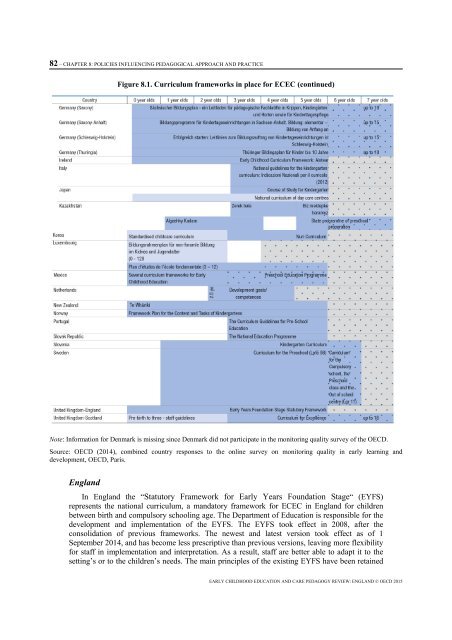82 – CHAPTER 8: POLICIES INFLUENCING PEDAGOGICAL APPROACH AND PRACTICEFigure 8.1. Curriculum frameworks in place for ECEC (continued)Note: Information for Denmark is missing since Denmark did not participate in the monitoring quality survey of the OECD.Source: OECD (2014), combined country responses to the online survey on monitoring quality in <strong>early</strong> learning <strong>and</strong>development, OECD, Paris.Engl<strong>and</strong>In Engl<strong>and</strong> the “Statutory Framework for Early Years Foundation Stage“ (EYFS)represents the national curriculum, a m<strong>and</strong>atory framework for ECEC in Engl<strong>and</strong> for childrenbetween birth <strong>and</strong> compulsory schooling age. The Department of Education is responsible for thedevelopment <strong>and</strong> implementation of the EYFS. The EYFS took effect in 2008, after theconsolidation of previous frameworks. The newest <strong>and</strong> latest version took effect as of 1September 2014, <strong>and</strong> has become less prescriptive than previous versions, leaving more flexibilityfor staff in implementation <strong>and</strong> interpretation. As a result, staff are better able to adapt it to thesetting’s or to the children’s needs. The main principles of the existing EYFS have been retainedEARLY CHILDHOOD EDUCATION AND CARE PEDAGOGY REVIEW: ENGLAND © OECD 2015
CHAPTER 8: POLICIES INFLUENCING PEDAGOGICAL APPROACH AND PRACTICE – 83throughout its revisions but have been made more succinctly, while the partnerships betweenparents <strong>and</strong> professionals have been strengthened <strong>and</strong> assessments of children’s developmentsimplified. The EYFS reshaped its learning areas <strong>and</strong> goals in accordance, where possible, withthe baseline for the national curriculum, aligning it more closely with primary <strong>education</strong>. Thisputs settings under more pressure to collaborate with schools to ease the transition (DfE, 2012).EYFS has seven learning domains, under three overarching ones: communication <strong>and</strong>language; physical development; <strong>and</strong> personal, social <strong>and</strong> emotional development. It alsodesignates four specific areas: literacy, mathematics, underst<strong>and</strong>ing the world, <strong>and</strong> expressive arts<strong>and</strong> design (DfE, 2014). Goals are defined in each area, <strong>and</strong> children are assessed on these goalsat age 2 <strong>and</strong> before making the transition to primary school, resulting in an individual EYFSprofile for every child, which is passed onto the parents <strong>and</strong> primary school teachers (DfE, 2014).In addition to EYFS, there are non-statutory guidelines for practitioners <strong>and</strong> inspectors, titled“Development Matters“ <strong>and</strong> “Early Years Outcomes“. These are intended to help professionalsimplement the EYFS statutory guidelines <strong>and</strong> inform them about child development <strong>and</strong>developmental outcomes through the <strong>early</strong> years.FranceFrance’s écoles maternelles also have a competency-based curriculum, which stems from2008. It lists five areas in which children are supposed to gain competence before transitioning toschool: developing oral language <strong>and</strong> an introduction to writing; learning how to work together;acting <strong>and</strong> expressing emotions <strong>and</strong> thoughts with one’s body; discovering the world; <strong>and</strong>imagining, feeling, <strong>and</strong> creating (OECD, 2004; Cochran, 2011). In the autumn of 2015, a newcurriculum for preschools will be introduced focusing on language development; physicaldevelopment; artistic development; critical thinking; <strong>and</strong> exploring the world. This newcurriculum will have a stronger focus on the importance of play <strong>and</strong> learning through play then its2008 version. The French preschool curriculum is more prescriptive than the curriculum in itscomparative countries, <strong>and</strong> all preschools use the same framework in their pedagogical approachalthough what pedagogical activities are conducted, can be chosen by the staff. The Frenchpreschool curriculum is also closely aligned to the separate curriculum for primary schools.There is a guidebook for assessment of children in the last year of preschool which coversareas of language, mathematics, <strong>and</strong> social <strong>and</strong> civic competences (Department of Education,2010). Teachers are not required to conduct the assessment according to the guidebook, but theyare required to produce an “acquisition report” for each child, which has to be shared with theparents of the child <strong>and</strong> can be used to smoothen the transition from preschool to primary school(Eurydice, 2014). The report usually includes information on how the child has developed <strong>and</strong> themost relevant information for the primary school to take into account regarding that child’sparticular development. Assessments can be included in the acquisition report as well. What isspecifically included in the report differs between settings as the staff of preschools discuss <strong>and</strong>decide about the content of their preschool’s report.The <strong>care</strong> sector does not have a national curriculum, but a regulation from 2000 emphasisesthe responsibilities of institutions to promote children’s well-being <strong>and</strong> development (Rayna,2007; Vitali, 2007). Each institution must develop an <strong>education</strong>al plan setting out the objectives<strong>and</strong> resources that will be used to ensure <strong>care</strong>, development, <strong>early</strong> learning, well-being; stimulateindividualised relationships <strong>and</strong> meet the psychological, physiological <strong>and</strong> emotional needs ofchildren (Vitali, 2007). The plan must include a “pedagogical project” outlining daily activities topromote these goals, <strong>and</strong> a “social project” situating the facility in the local social <strong>and</strong> economiccontext (Vitali, 2007).EARLY CHILDHOOD EDUCATION AND CARE PEDAGOGY REVIEW: ENGLAND © OECD 2015



